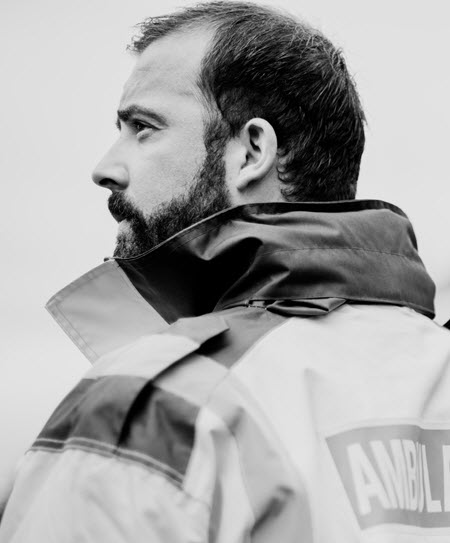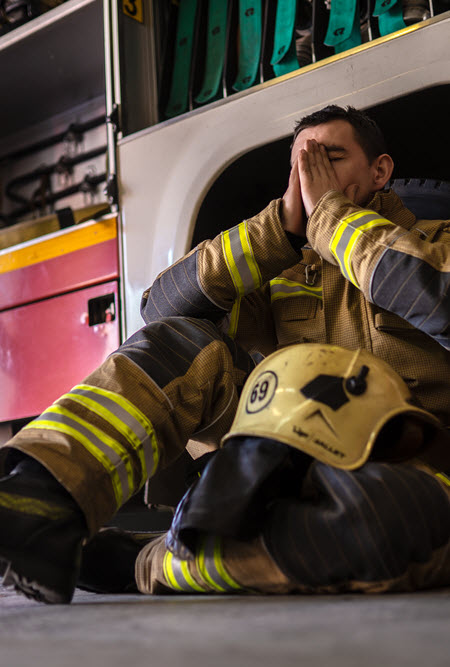 When you live on the front lines of crisis…
When you live on the front lines of crisis…
Military personnel, police officers, firefighters, nurses, EMTs, dispatchers, coroners, corrections officers, and all other crisis workers… they all suffer from the effects of vicarious trauma because of their frequent contact with human suffering.
Day in and day out, you suit up and go to work. But unlike most, you have chosen a profession rooted in the service to others.
More to the point, you’re there to help during their darkest times. Cars are wrecked, homes burnt to the ground, children are kidnapped, lives are lost on the operating table, families are weeping as their loved ones are taken from them.
They are suffering. They cry, they yell, they scream. Too many times they are crying, yelling, and screaming at you. Maybe you’re the one taking their loved one away. Maybe you tried your best, but the house burned down anyway. Maybe you ran out of leads in the kidnapping case. You tried.
All the same, they are suffering.
You understand it because you feel it, too.
You wanted to save the house from burning down.
You spent your whole career developing your skills to find that child and must watch the parents weep when you tell them you can’t find their baby.
You did CPR on that patient until you nearly passed out only to watch the family crying and holding each other as they pulled the bedsheet over their loved one’s head. You tried.
But… day in and day out, you STILL suit up and go to work.
 There’s “a cost of caring for others”…
There’s “a cost of caring for others”…
It’s called “vicarious trauma” (aka “compassion fatigue”), and it’s unique to these front-line workers.
No matter how good we are, we can’t save them all.
There are times that you encounter a situation that bothers you more than you thought it would – something so horrible or disturbing that you just can’t get it out of your thoughts.
In the beginning, we start by suppressing the emotions. We push it down deep knowing that they aren’t helping. We focus on after-action reviews.
What did we do well?
What did we do wrong?
How can we do it better next time?
Then we train, we get better. But we still feel the loss.
Over time, the cycle repeats over and over and over again. After a while, not only are we suffering from the latest horrible thing, but we see something or hear something that reminds us of horrible things from the past. Our emotions race, but we can’t keep them down anymore.
Many people turn to drugs or alcohol…
… hoping they will deaden some of the pain.
It works for a while – until it doesn’t. The emotions start to bubble up when they aren’t supposed to.
All of a sudden you explode on a friend who makes an off-handed comment. You’re not sure why that happened. It’s getting worse.
Some decide they can’t take it. They decide to take their own life.
But not you… you’re determined to work through this, and we are here to help you do it.
 People working in the hero communities are trained to save others. BUT…
People working in the hero communities are trained to save others. BUT…
As humans, we’re capable of caring… but we’re just not built to endure suffering and trauma over and over for years or even decades at a time.
Think about it: The human body isn’t naturally built to do an Ironman triathlon. Swimming, biking, and running hundreds of miles at a time seems impossible, yet many people have done it.
How? They trained for it!
You can manage vicarious trauma in a similar way…
The substances prolong the eventual crash, but they don’t stop it. To stop it, you must start tackling the problem. You must stop suppressing the emotions, and instead, you must start feeling them.
By tackling them head-on, you will give them a chance to dissipate, to leave you through the normal emotional cycle.
How we cope with the trauma we experience shapes how we interact with others in our life. It shapes how we handle situations that arise that could bring on more stress or hurt.
We’ll provide you tools and strategies that help combat the anger, fear, and worry you experience because of your work – past, present, and future.
Imagine knowing how to diffuse an argument with a loved one before regrettable and hurtful words are exchanged.
Imagine experiencing peace, comfort, and acceptance knowing that you did all you could to help those who need you the most – on the job and at home.
Don’t wait until you’re 20 years down the road…
… when you’re weighed down by years of unhealthy coping strategies, and your life is falling apart.
But if you’re like many others who have waited 20 years before getting help, that’s ok, too. With some work and patience, we can help you get your life back.
Let us help you develop resiliency strategies to cope with these events as they arrive.
Stop just surviving… it’s time to start thriving! Get started now by giving us a call: (720) 379-3759.

